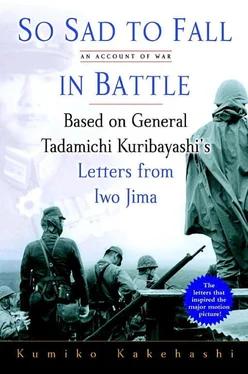One thing that had made Kuribayashi’s men stand firm through the dreadful horrors of a battle they were doomed to lose was their desire to protect Japanese civilians from the horrors of air raids. They hoped that, while they were delaying the American invasion of the homeland, negotiations to end the war would get under way. For Kuribayashi, who always expected Japan to be defeated, that was the only thing that could give meaning to his sacrificing the lives of the men under his command.
Of all the letters Kuribayashi sent to his family, only four do not touch on the subject of air raids against the Japanese mainland. He urges them to be careful, lectures them about taking shelter, repeats that he and all the other fathers are fighting on Iwo Jima so that the people back on the mainland will be spared from air raids. The thought that he was going to lay down his life in Iwo Jima to protect his wife and children in Tokyo probably sustained Kuribayashi, just as it did the other officers and men.
But then Tokyo was ravaged by fire, and ordinary civilians were killed. When he heard the news, Kuribayashi’s despair and sense of failure must have been tremendous. He did not even know if his wife and children were alive. They were, in fact, safe and sound—but he had no way of knowing that.
NONETHELESS, HE DID NOT lose the will to fight.
After postponing the attack on the night of the seventeenth, Kuribayashi spent a further eight days waiting patiently for the right moment for an all-out attack. The other survivors surely admired Kuribayashi, who, though exhausted and aged beyond his years, still refused to abandon his policy of endurance, and forbade any premature assault. Or were some of them fed up? Now that they were trapped, many of his men must have just wanted to get their charge over and done with as soon as possible. They had, after all, drunk their parting toasts to one another on the seventeenth.
It can certainly be argued that given the realities of the situation—the mainland devastated by B-29s and ordinary civilians engulfed in the horrors of war—the main reason to defend Iwo Jima so doggedly had now vanished. On the other hand, were the island to be completely conquered, bigger American units could come ashore to give the runways a proper overhaul. Clearly that would only make the air raids on the mainland worse.
Kuribayashi remained firm, and his commitment to holding out to the end, in an effort to reduce the damage wrought by air raids on the mainland, never wavered. Nor had he abandoned the notion that making the enemy bleed would help peace negotiations to proceed on more favorable terms.
I suspect that there was a further reason why Kuribayashi did not make a banzai charge, no matter how bad things got.
The victim of a series of policy changes in the overall strategy of the military central command, Iwo Jima ended up having to face the enemy all by itself.
Initially the Imperial General Headquarters had regarded Iwo Jima as important. Why else would they send twenty thousand soldiers to the place? But as the Americans’ invasion got nearer, the island was suddenly labeled worthless and cut off. The Japanese forces on Iwo Jima ended up having to fight with almost no support from the air force or the navy. Daihonei Rikugunbu 10 Shôwa nijû-nen hachi-gatsu made (“Imperial General Headquarters Army Section, Volume 10: Up to August 1945”) in the Senshisôsho official history produced by the Military History Department of the National Institute for Defense describes how the Imperial General Headquarters took the news of the fall of Iwo Jima.
The military central command had foreseen the loss of Iwo Jima to some degree. They praised the gallant fighting of the defense garrison and admired the way Kuribayashi had exercised his command, but did not display any very marked reaction.
They “had foreseen the loss of Iwo Jima to some degree” so they “did not display any very marked reaction.” How casually the war leaders were prepared to give up on twenty thousand lives!
The Imperial General Headquarters ran through a series of stopgap policies that had no relation to reality, and then, when they got deadlocked and had nowhere to go, they wrote places off as hopeless. The result was soldiers going to their deaths in banzai charges that they themselves knew to be almost ineffectual in places the headquarters had decided to abandon, while the generals killed themselves by committing hara-kiri. This is what happened on Attu and Talau, and at Saipan and Guam. My guess is that Kuribayashi did not want to be party to the fraud of calling such a death by the meretricious name of gyokusai , “honorable death”—a combination of the ideograms for “beautiful jewel” and “pulverize”—or of using the samurai aesthetic to conceal mistaken projections and foolhardy strategies.
Kuribayashi was a rationalist, and he loved the soldiers who served under him. If they were in a battle from which they could not return alive, then the least he could do was give them a “worthwhile death,” and that is why his policy of not allowing banzai charges stayed consistent from first to last.
Kuribayashi was a warrior who respected the realities, if not the aesthetic conventions of war, and the extreme campaign that he waged on Iwo Jima and the manner in which he chose to die showed just how empty the values professed by the Japanese military establishment were.
The American encirclement relaxed a little around the nineteenth. Kuribayashi took his time examining the situation, and on the evening of the twenty-fourth judged that the siege had loosened sufficiently to provide a window for the attack.
According to Ôyama Jun, one of the survivors, Kuribayashi delivered a speech before the attack on the night of March 25.
Even if I should perish before you in the battle, the glorious exploits that you have carried out will never be forgotten. Japan may now be losing this battle, but the people of Japan are burning at your loyalty and your patriotism; they are praising your glorious deeds; and the day will come when they offer silent prayers for your ghosts. Be easy in your minds and sacrifice yourself for your country. [5] From Okada Masukichi, “Iô-Jima ni Kakeru Shôgai” (“Lives on the Line at Iwo Jima”), Maru , June 1959.
“I will at all times be at your head,” Kuribayashi had said in the appeal telegraphed to all the surviving men, and, true to his word, Kuribayashi took up his position at the head of around four hundred men from the army and the navy. They rose above despair and summoned up their last reserves of willpower.
Normally during a final all-out charge, the commanding officer would commit hara-kiri behind the lines. But this was yet another convention that Kuribayashi ignored. A document related to practical training on Iwo Jima from the Ground Self-Defense Force Officer School says: “There is no other example in the history of the Japanese army where a division commander (army corps commander) led the charge himself. This all-out counterattack is highly unusual.”
Led by Kuribayashi, the group moved south along the coast down toward Mount Suribachi and fell upon an encampment of marines and army air corps just after five o’clock on the morning of the twenty-sixth. The Americans, who were confident that organized resistance by the Japanese was long over, fell into panic. After a furious fight at close quarters lasting for around three hours, the Japanese had inflicted 170 casualties on the Americans. The surviving Japanese soldiers then made a charge onto Motoyama and Chidori Airfields, where the majority of them were killed.
The Americans did not know that Kuribayashi had led this attack. It was nothing like a banzai charge. The Japanese soldiers made a silent and well-organized attack that took the Americans by surprise and caused them unexpected damage. The entry on “Iwo Jima” in the United States Marine Corps History evaluates it thus: “The Japanese attack on the early morning of March 26 was not a banzai charge, but an excellent plan aiming to cause maximum confusion and destruction.”
Читать дальше












